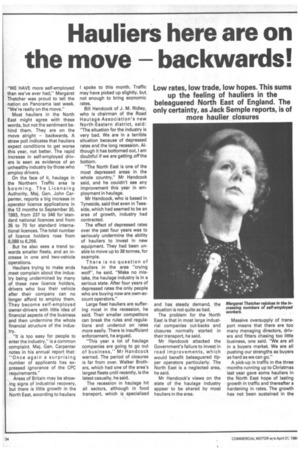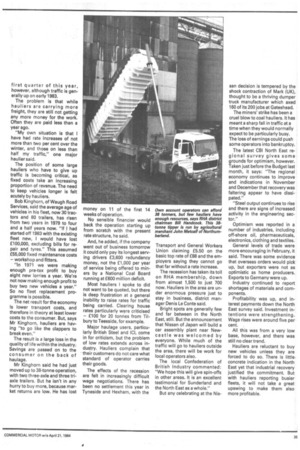Hauliers here are on the move backwards!
Page 36

Page 37

If you've noticed an error in this article please click here to report it so we can fix it.
Low rates, low trade, low hopes. This sums up the feeling of hauliers in the beleaguered North East of England. The only certainty, as Jack Semple reports, is of more haulier closures
"WE HAVE more self-employed than we've ever had," Margaret Thatcher was proud to tell the nation on Panorama last week. "We're really on the move."
Most hauliers in the North East might agree with these words, but not the sentiment behind them. They are on the move alright — backwards. A straw poll indicates that hauliers expect conditions to get worse this year, not better. The rapid increase in self-employed drivers is seen as evidence of an unhealthy industry by those who employ drivers.
On the face of it, haulage in the Northern Traffic area is booming. The Licensing Authority, Maj. Gen. John Carpenter, reports a big increase in operator licence applications in the 12 months to September 30, 1983, from 237 to 346 for 'standard national licences and from 35 to 70 for standard international licences. The total number of licence holders rose from 6,088 to 6,256.
But he also sees a trend towards smaller fleets, and an increase in one and two-vehicle operations.
Hauliers trying to make ends meet complain about the industry being undermined by many of these new licence holders, drivers who buy their vehicle after their company can no longer afford to employ them. They become self-employed owner-drivers with little idea of financial aspects of the business and then undermine the whole financial structure of the industry.
"It is too easy for people to enter the industry," is a common complaint. Maj. Gen. Carpenter notes in his annual report that: "Once again a surprising number of applicants has expressed ignorance of the CPC requirements."
Areas of Britain may be showing signs of industrial recovery, but there is little growth in the North East, according to hauliers I spoke to this month. Traffic may have picked up slightly, but. not enough to bring economic rates.
Bill Handcock of J. M. Ridley, who is chairman of the Road Haulage Association's new North-Eastern district, said: "The situation for the industry is very bad. We are in a terrible situation because of depressed rates and the long recession. Although it has bottomed out, I am doubtful if we are getting off the bottom.
"The North East is one of the most depressed areas in the whole country," Mr Handcock said, and he couldn't see any improvement this year in employment in haulage.
Mr Handcock, who is based in Tyneside, said that even in Tees side, which had seemed to be an area of growth, industry had contracted.
The effect of depressed rates over the past four years was to seriously undermine the ability of hauliers to invest in new equipment. They had been unable to move up to 38 tonnes, for example.
There is no question of hauliers in the area "crying wolf", he said. "Make no mis take, the haulage industry is in a serious state. After four years of depressed rates the only people who are buying now are own-account operators."
Large fleet hauliers are suffering most in the recession, he said. Their smaller competitors can break the rules and regulations and undercut on rates more easily. There is insufficient enforcement, he argued.
"This year a lot of haulage companies are going to go out of business," Mr Handcock warned. The period of closures is far from over. Walker Broth ers, which had one of the area's largest fleets until recently, is the latest casualty, he said.
The recession in haulage hit all sectors, although in food transport, which is specialised and has steady demand, the situation is not quite as bad.
The problem for the North East is that in most large industrial companies cut-backs and closures normally started in their transport, he said.
Mr Handcock attacked the Government's failure to invest in road improvements, which would benefit beleaguered tipper operators particularly. The North East is a neglected area, he said.
Mr Handcock's views on the state of the haulage industry appear to be shared by most hauliers in the area. Massive oversupply of transport means that there are too many managing directors, drivers and fitters chasing too little business, one said. "We are all in a buyers market. We are all pushing our strengths as buyers as hard as we can go."
A pick-up in traffic in the three months running up to Christmas last year gave some hauliers in the North East hope of lasting growth in traffic and thereafter a hardening in rates. The growth has not been sustained in the first quarter of this year, however, although traffic is generally up on early 1983.
The problem is that while hauliers are carrying more freight, they are still not getting any more money for the work. Often they are paid less than a year ago.
"My own situation is that I have had rate increases of not more than two per cent over the winter, and those on less than half my traffic," one major haulier said.
The position of some large hauliers who have to give up traffic is becoming critical, as fixed costs take an increasing proportion of revenue. The need to keep vehicles longer is felt acutely by hauliers.
Bob Kinghorn, of Waugh Road Services, said the average age of vehicles in his fleet, now 30 trac tors and 80 trailers, has risen from two years in 1979 to four and a half years now. "If I had started off 1983 with the existing fleet new, I would have lost £100,000, excluding bills for repair and tyres." This assumed £55,000 fixed maintenance costs — workshop and fitters.
"In 1971 we were making enough pre-tax profit to buy eight new lorries a year. We're not now making enough profit to buy two new vehicles a year." So no fleet replacement programme is possible.
The net result for the economy is lower transport costs, and therefore in theory at least lower costs to the consumer. But, says Mr Kinghorn, hauliers are having "to go like the clappers to break even."
The result is a large loss in the quality of life within the industry.
Savings are passed on to the consumer on the back of haulage.
Mr Kinghorn said he had just moved up to 38-tonne operation, with two three-axle and three triaxle trailers. But he isn't in any hurry to buy more, because market returns are low. He has lost money on 11 of the first 14 weeks of operation.
No sensible financier would back the operation starting up from scratch with the present rate structure, he said.
And, he added, if the company went out of business tomorrow it could only pay its longest serving drivers £3,600 redundancy money, not the £1,000 per year of service being offered to miners by a National Coal Board running at £600 million deficit.
Most hauliers I spoke to did not want to be quoted, but there is deep frustration at a general inability to raise rates for traffic being carried. Clearing house rates particularly were criticised — £100 for 20 tonnes from Tilbury to Teesside, for example.
Major haulage users, particularly British Steel and ICI, come in for criticism, but the problem of low rates extends across industry. Hauliers complain that their customers do not care what standard of operator carries their goods.
The effects of the recession are felt in increasingly difficult wage negotiations. There has been no settlement this year in Tyneside and Hexham, with the Transport and General Workers Union claiming £5.50 on the basic top rate of £88 and the employers saying they cannot go that far without a rate increase.
The recession has taken its toll on RHA membership, down from almost 1,500 to just 700 now. Hauliers in the area are under enormous pressure just to stay in business, district manager Denis Le Conte said.
Bright spots are generally few and far between in the North East, still. But the announcement that Nissan of Japan will build a car assembly plant near Newcastle was welcomed by everyone. While much of the traffic will go to hauliers outside the area, there will be work for local operators also.
The local Confederation of British Industry commented: "We hope this will give spin-offs in other areas. It is an excellent testimonial for Sunderland and the North East as a whole."
But any celebrating at the Nis
san decision is tempered by the shock contraction of Mark (UK), thought to be a thriving dumper truck manufacturer which axed 160 of its 200 jobs at Gateshead.
The miners' strike has been a cruel blow to coal hauliers. It has meant a sharp fall in traffic at a time when they would normally expect to be particularly busy. The loss of earnings could push some operators into bankruptcy.
The latest CBI North East regional survey gives some grounds for optimism, however. Taken just before the Budget last month, it says: "The regional economy continues to improve and indications in November and December that recovery was faltering appear to have dissipated."
"Steel output continues to rise and there are signs of increased activity in the engineering sector."
Optimism was reported in a number of industries, including off-shore oil, pharmaceuticals, electronics, clothing and textiles. General levels of trade were more encouraging in February, it said. There was-some evidence that overseas orders would pick up, but exporters were not as optimistic as home producers. Exports to Germany were up.
Industry continued to report shortages of materials and components.
Profitability was up, and interest payments down the North East survey said. Investment intentions were strengthening. Wage rises were around five per cent. , All this was from a very low base, however, and there was still no clear trend.
Hauliers are reluctant to buy new vehicles unless they are forced to do so. There is little.
concrete indication in the North East yet that industrial recovery justified the commitment. But with hauliers reporting busier fleets, it will not take a great upswing to make them also more profitable.




















































































